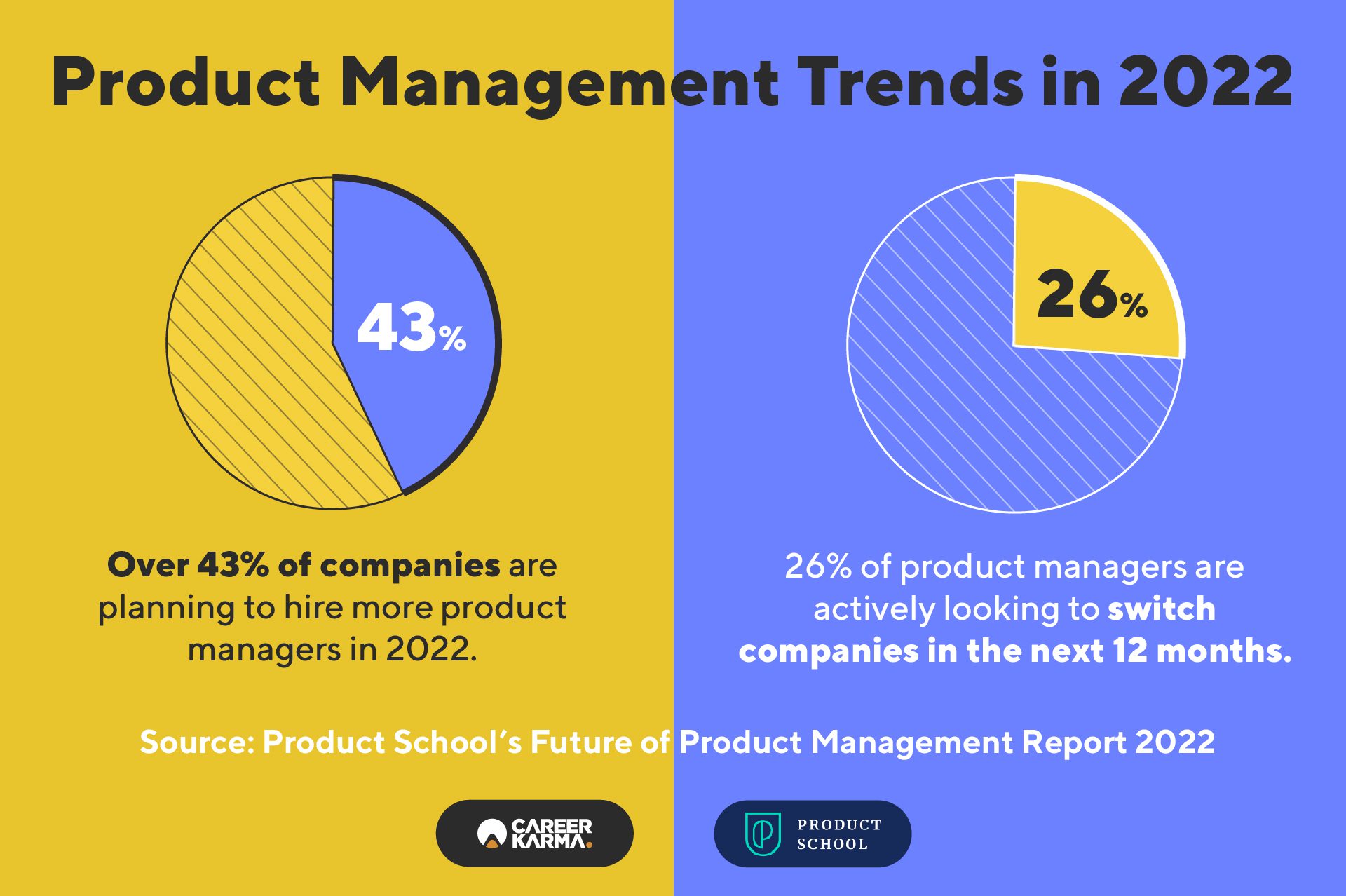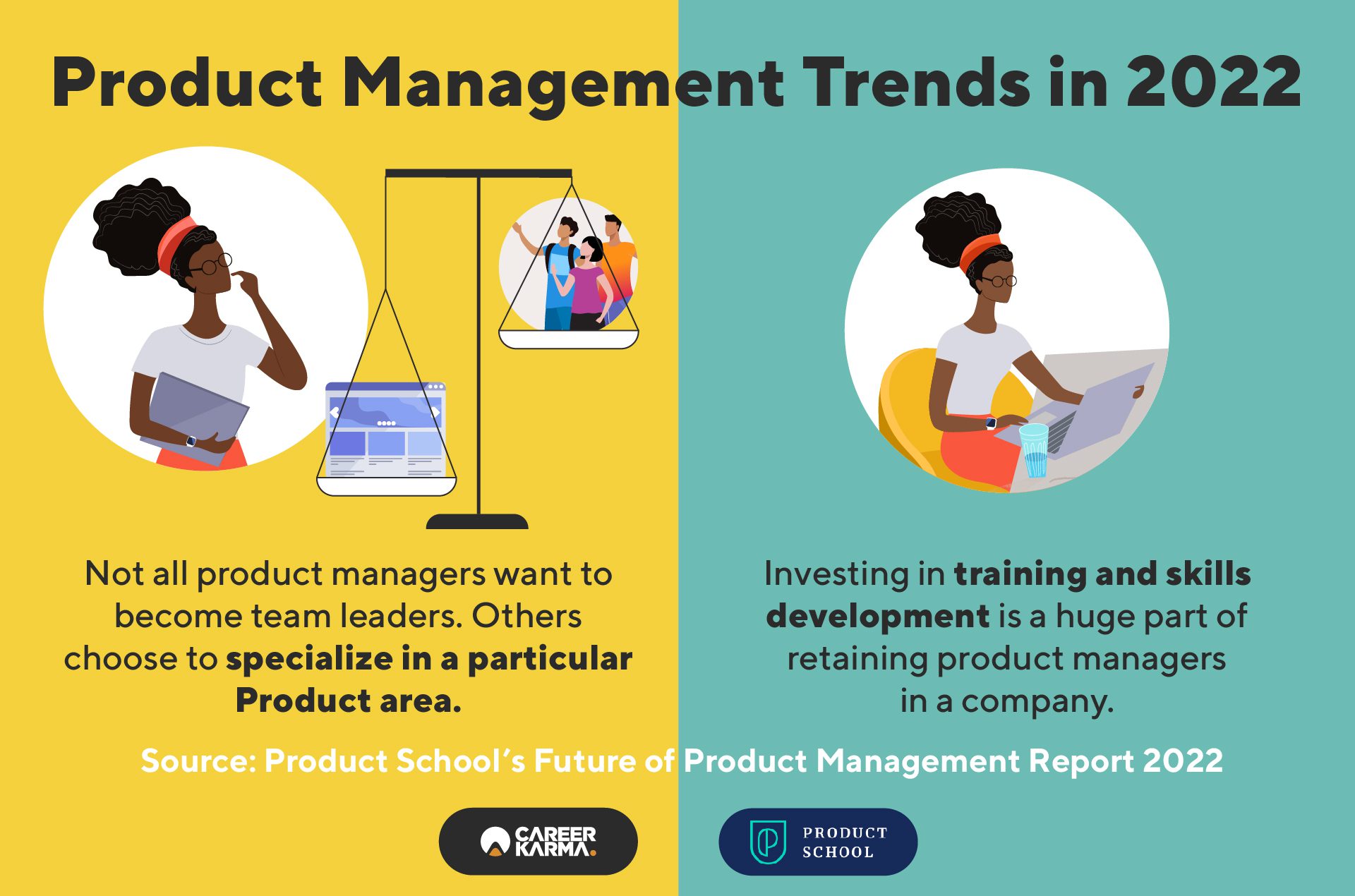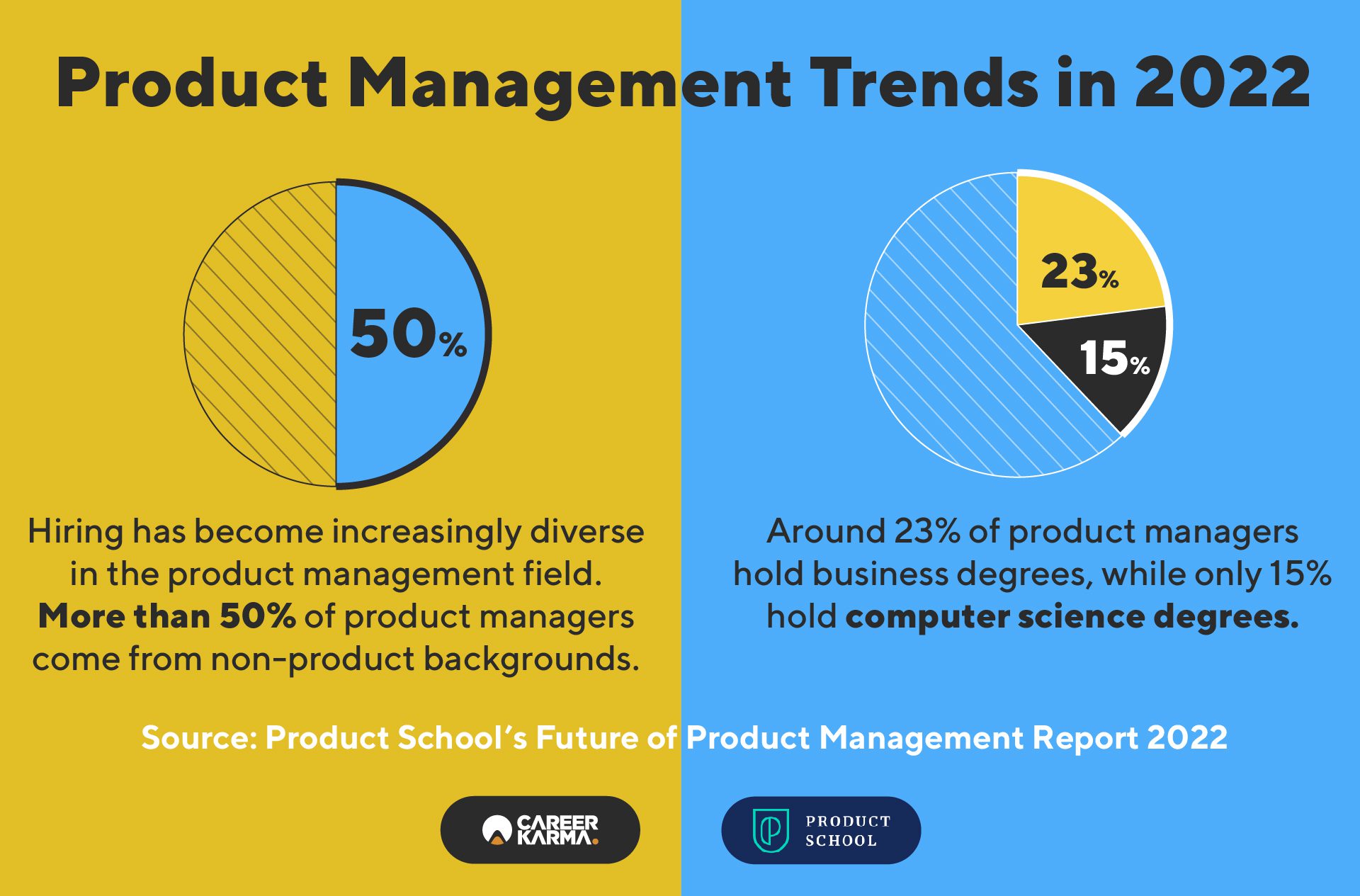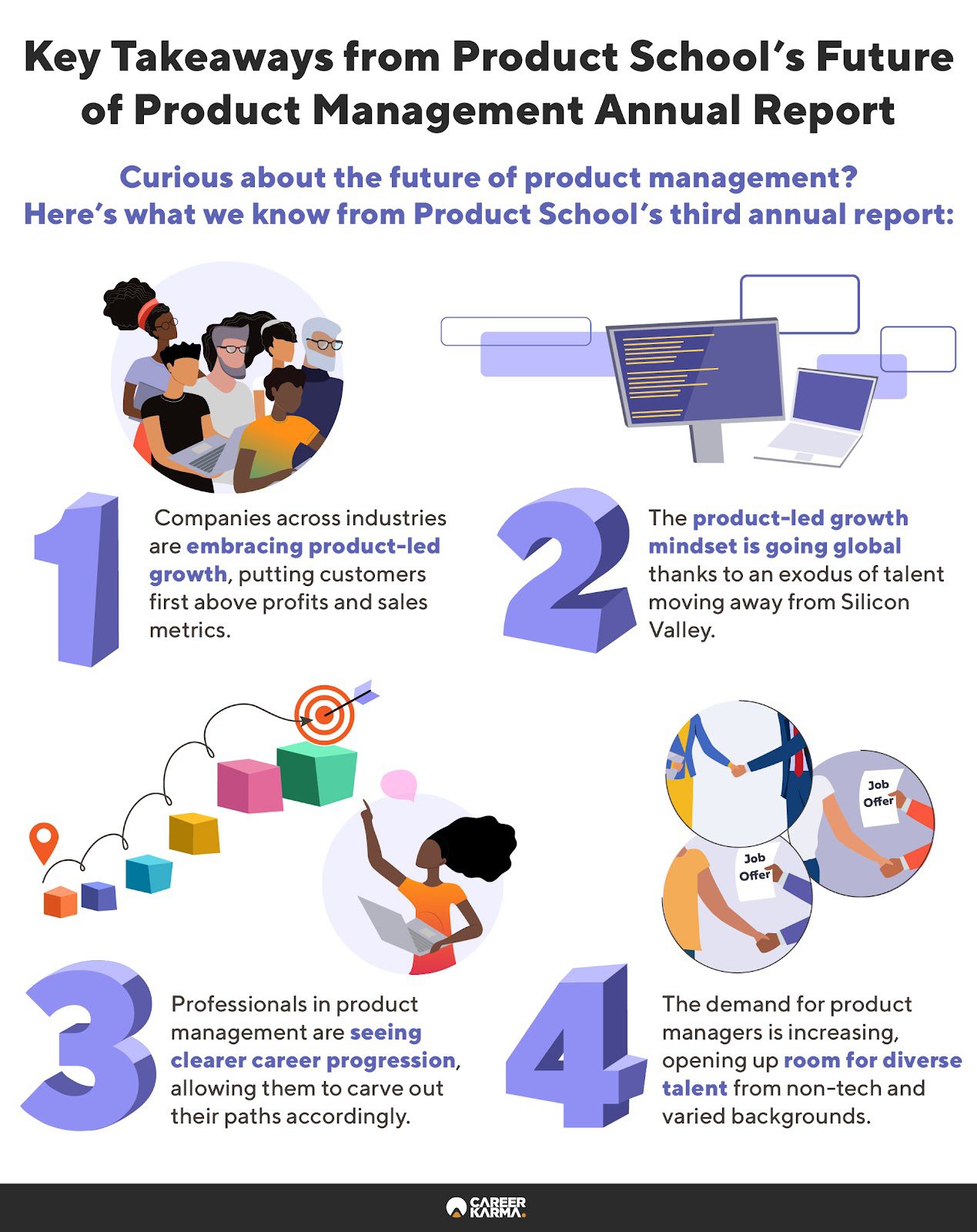If a company is looking for a sure-fire way to grow its customer base and revenue, product management is one of the most important functions it can invest in. While a product manager’s specific responsibilities may vary depending on the industry, nature of business, and product, the role has primary functions that stay consistent across all organizations. These include conceptualizing, creating, and delivering a product that customers want to use and are willing to pay for.
As more companies realize the need to focus on products, the field of Product Management continues to grow. LinkedIn listed Product Management as one of the fastest growing roles on the market in 2022 and Glassdoor announced Product was one of the 50 Best Jobs in America. And it’s not just companies that are attracted to the Product role: Product Professionals are 149 percent more likely to receive a promotion, according to LinkedIn, making it a highly lucrative career path.
If you want to know more about recent trends in the field, Product School, a global leader in product management training, collaborated with product leaders from top-tier tech companies to create this year’s “Future of Product Management Report”. Let’s take a look at the critical insights from over 5,000 product professionals featured in this report.
Product School has released its latest Future of Product Management Report to give readers insight into what’s next for product management.
Download the full report on Product School’s website.Top Trends in Product Management in 2022
The 2022 Future of Product Management Report aims to identify key trends driving the product management industry forward and help product managers better understand the industry’s current state. To generate the report, Product School surveyed its global community of over one million product managers and more than 10,000 alumni.
The company also teamed up with a group of top product leaders from Silicon Valley to give more perspective to the findings and add an expert’s viewpoint to the trends. The result is an in-depth look into what product managers can expect in the near future.
1. Product-Led Growth Is Changing Everything

Companies across all industries are increasingly becoming customer-centric, and Product-Led Growth is leading the way. In the past, companies were primarily led by profit and sales metrics. Today, they are putting customers and products first by measuring success with metrics like NPS (Net Promoter Score) and CSAT (Customer Satisfaction) scores.
With more companies turning to PLG to drive growth and innovation, product managers are in high demand. Over 43 percent of companies worldwide are planning to hire more PMs in 2022. Conversely, 26 percent of PMs are actively looking to transition companies in the next 12 months. This mismatch poses a supply problem for organizations hoping to jump on the PLG bandwagon.
An essential part of attracting and retaining talent is value alignment between the company and potential product candidates. What does this mean? Compensation is the biggest factor in whether a PM will stay at their current company or look for other opportunities, with over 31 percent of PMs stating they would happily leave for better compensation. But in situations where compensation offers are competitive (read: similar), it’s the values like remote work and the types of products the team works on that win top talent.
Attracting and retaining top product talent then depends on Recruitment Managers understanding what constitutes a competitive offer and Product Leaders communicating company values during the interview process.
2. Evolution of Product Career and the Impact on Product Leaders

Companies are desperate for Product talent, but many of these companies don’t yet have the career progression ladders set up that will keep top talent learning and growing from within. Many product managers feel that they don’t have a clear career path or vision for advancement within their organizations, which is causing them to look for advancement externally. Indeed, 33 percent of PMs only plan to stay in their current company for one to two years before leveling up and switching companies.
With more Individual Contributor (IC) tracks emerging, the Product role is evolving. Not all product managers want to become team leaders, and in some cases, the option to specialize in a particular Product area is especially appealing. Companies need to look at the evolution of engineering or marketing roles to get an idea of how IC and specialization and traditional management career paths can be set up for Product professionals.
Product leaders need to have a clear idea of what they want their team to achieve and help them reach their goals. Investing in training is a huge part of retaining product managers and enabling them to explore their career options without leaving the company. And the ROI is clear: 94 percent of employees would stay at their company longer if it invested in ongoing learning and development, states LinkedIn.
3. Product Teams Are Diversifying

Product managers today are coming from increasingly diverse personal and professional backgrounds. Where technical degrees were once a standard (although not a requirement) for product managers, today, business degrees (23 percent) outweigh computer science degrees (15 percent) in the role. Having the “right” diploma or product-specific experience is no longer necessary to become a successful product manager. More than 50 percent of PMs come from non-product backgrounds.
When a company looks beyond typical tech backgrounds to find talent, employers have an excellent opportunity to increase much-needed diversity in their organizations. They also have a chance to use a more inclusive approach when conceptualizing and developing new products.
Hiring from non-tech and varied backgrounds is also one great way to meet the record demand for product talent. Opening product roles to non-traditional applicants allows companies to grow their product teams while meeting their Diversity, Equity, and Inclusion (DEI) goals. As organizations work towards becoming more diverse and inclusive, product management is an area that welcomes this change.
The Value of The Future of Product Management Report

The Future of Product Management Report is a relevant guide that gives helpful insights to current product leaders and aspiring product managers. It also serves as an essential guide for companies looking to adopt Product-Led Growth.
For aspiring product managers, the report gives a thorough overview of the trends and insights of the product management industry. It can prepare them to enter the job market and enable them to share industry insights during job interviews. The Report also points to the type of training that companies, product leaders, and product managers should offer their teams today and in the future.
Whether you work as a product manager or are hoping to transition into Product, Product School’s third Future of Product Management Report will give you the actionable insights that will guide your next step forward.
To read the entire report, visit the Product School website.
About us: Career Karma is a platform designed to help job seekers find, research, and connect with job training programs to advance their careers. Learn about the CK publication.




